
CHROMATOGRAPHIA
Scope & Guideline
Illuminating the Path of Chemical Innovation
Introduction
Aims and Scopes
- Development and Validation of Analytical Methods:
The journal consistently publishes studies that involve the development and validation of new chromatographic methods, particularly in high-performance liquid chromatography (HPLC) and gas chromatography (GC). These methods are often aimed at enhancing sensitivity, specificity, and speed in analyzing complex samples. - Application of Chromatography in Pharmaceutical Analysis:
A significant focus is on the application of chromatographic techniques for the analysis of pharmaceutical compounds, including the quantification of active ingredients, impurities, and degradation products in drug formulations. - Environmental and Food Safety Analysis:
Research published in CHROMATOGRAPHIA frequently addresses the use of chromatography in environmental monitoring and food safety, including the detection of contaminants, pesticides, and other harmful substances in food and water samples. - Innovation in Chromatographic Techniques:
The journal highlights novel approaches and advancements in chromatographic technologies, such as the use of new stationary phases, innovative extraction methods, and hyphenated techniques that combine chromatography with mass spectrometry. - Chiral Separations and Stereochemistry:
There is a notable emphasis on chiral separations, with studies focusing on the development of chiral stationary phases and methodologies for the analysis of enantiomers in pharmaceuticals and natural products.
Trending and Emerging
- Green Chemistry and Sustainable Practices:
There is a growing emphasis on environmentally friendly chromatographic methods, including the use of green solvents and sustainable practices in method development. This trend aligns with global initiatives aimed at reducing the environmental impact of analytical chemistry. - Integration of Artificial Intelligence and Machine Learning:
Recent publications are increasingly incorporating artificial intelligence and machine learning techniques for method optimization and data analysis in chromatography. This trend represents a significant advancement in the field, enabling more efficient and accurate analyses. - Advanced Hyphenation Techniques:
The combination of chromatographic techniques with mass spectrometry and other analytical methods is becoming more prominent. These hyphenated techniques allow for more comprehensive analysis and better characterization of complex samples, particularly in pharmaceutical applications. - Focus on Biopharmaceuticals and Biologics:
Research related to the analysis of biopharmaceuticals and biologics is on the rise, reflecting the growing importance of these compounds in modern medicine. Studies often involve the characterization and quantification of proteins, peptides, and other biomolecules. - Personalized Medicine and Pharmacogenomics:
An emerging focus on personalized medicine, particularly in pharmacogenomics, is evident in recent publications. This trend highlights the need for tailored therapeutic strategies based on individual genetic profiles, requiring advanced chromatographic techniques for drug monitoring and analysis.
Declining or Waning
- Traditional Chromatography Techniques:
There has been a gradual decline in the publication of studies centered on traditional chromatographic techniques without innovative modifications. As the field evolves, there is a preference for more advanced methodologies that enhance efficiency and effectiveness. - General Environmental Monitoring:
Research specifically focused on general environmental monitoring techniques appears to be decreasing. Instead, there is a shift towards more specialized applications, such as the analysis of specific pollutants or contaminants in targeted studies. - Basic Method Comparison Studies:
Papers that simply compare existing chromatographic methods without contributing new insights or improvements are becoming less frequent. The journal now favors publications that offer novel methodologies or significant advancements rather than basic comparative analyses.
Similar Journals
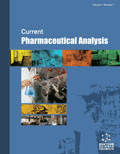
Current Pharmaceutical Analysis
Catalyzing Discoveries in Biochemistry and Molecular MedicineCurrent Pharmaceutical Analysis, published by Bentham Science Publishers Ltd, is a vital resource for professionals and researchers in the fields of Pharmaceutical Science, Biochemistry, and Molecular Medicine. Established in 2006, this peer-reviewed journal aims to provide a platform for the latest advancements and analytical methodologies in pharmaceutical research and drug development. Over the years, it has garnered attention for its rigorous scrutiny and contributions to the landscape of pharmacology, evidenced by its quartile placements in various categories, most notably Q3 in Pharmaceutical Science. Despite its current rankings placing it in the lower quartile in several disciplines, the journal remains an essential venue for both emerging and established researchers seeking to disseminate their findings. With the widespread accessibility of its articles, researchers, professionals, and students can engage with cutting-edge studies to foster innovation in pharmaceutical analysis. For access to the latest research contributions, readers can explore the digital archive and stay updated on pivotal discussions shaping the future of the pharmaceutical sciences.

JOURNAL OF ANALYTICAL CHEMISTRY
Catalyzing Progress in Analytical ChemistryJOURNAL OF ANALYTICAL CHEMISTRY, published by PLEIADES PUBLISHING INC, stands as a pivotal resource in the field of analytical chemistry, offering an innovative platform for researchers, professionals, and students to advance their knowledge and contribute to the discourse within the discipline. With an ISSN of 1061-9348 and an E-ISSN of 1608-3199, this journal features a focused exploration of analytical methodologies, instrumentation developments, and applications across various domains, contributing to practical and theoretical advancements in the field. Currently ranked in the Q3 category in Analytical Chemistry with a Scopus rank of #111 out of 156, it provides critical insights and innovation strategies for professionals aiming to enhance their analytical capabilities. Access to the journal is through standard subscription models, and it covers an extensive range of topics pertinent to the discipline from 1996 to 2024. Engage with the JOURNAL OF ANALYTICAL CHEMISTRY to be part of a vibrant research community dedicated to push the boundaries of analytical practices.
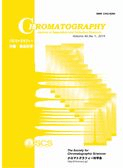
Chromatography
Advancing chromatographic excellence for innovative research.Chromatography is an esteemed journal published by the SOC CHROMATOGRAPHIC SCIENCES, dedicated to advancing the field of chromatographic techniques and their applications across various disciplines, including analytical chemistry, biochemistry, and environmental science. By facilitating the exchange of high-quality research, Chromatography plays a pivotal role in enhancing methodologies and technologies that drive innovation in sample analysis. While the journal is not currently open access, it maintains a rigorous peer-review process, ensuring the publication of valuable and impactful studies. Researchers, professionals, and students alike can benefit from its comprehensive coverage of chromatography-related advancements, making it a vital resource for anyone engaged in this dynamic area of study.
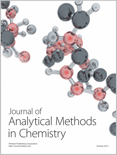
Journal of Analytical Methods in Chemistry
Empowering researchers with open access to cutting-edge findings.The Journal of Analytical Methods in Chemistry, published by HINDAWI LTD, stands as a premier platform dedicated to the dissemination of research in the vibrant field of analytical chemistry. With an ISSN of 2090-8865 and an E-ISSN of 2090-8873, this Open Access journal has been committed to providing unrestricted access to quality research since 1978, thereby fostering greater collaboration and innovation among researchers, professionals, and students globally. The journal showcases rigorous research insights spanning diverse categories, earning impressive Scopus rankings including Q2 in Chemical Engineering and Q3 in Analytical Chemistry for 2023, positioning itself effectively among respected peers. Its interdisciplinary approach also covers significant contributions in the realms of instrumentation and computer science applications, thus addressing contemporary challenges and advancements in analytical methodologies. By bridging theoretical underpinnings with practical applications, the Journal of Analytical Methods in Chemistry aims to catalyze knowledge exchange while enhancing the global discourse in analytical science.

Food Analytical Methods
Unveiling the science behind food quality and safety.Food Analytical Methods, published by Springer, is an esteemed journal dedicated to the innovative field of analytical methodologies within the food sciences. With an ISSN of 1936-9751 and E-ISSN of 1936-976X, this journal serves as a pivotal platform for researchers and professionals to exchange insights, methodologies, and findings related to food quality analysis, safety measures, and innovative technologies in food science. As of 2023, Food Analytical Methods boasts impressive Scopus rankings, including Q2 in Analytical Chemistry and Food Science, positioning it among the top journals in its category. The journal's commitment to enhancing food safety and quality through rigorous research underscores its importance in both academic and industrial applications. Although it does not currently operate under an open-access model, it provides exceptional value through its rigorous peer-review process and comprehensive publication standards, further inviting contributions from both established and emerging scientists in the field. With coverage spanning from 2008 to 2024, this journal continues to address critical research areas, thereby shaping the future of food analytics.
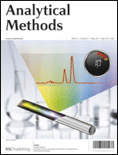
Analytical Methods
Elevating Standards in Analytical MethodologiesAnalytical Methods, published by the renowned Royal Society of Chemistry, is a distinguished journal that has been serving the scientific community since its inception in 2009. Specializing in the fields of Analytical Chemistry, Chemical Engineering, and General Engineering, this journal holds a reputable position with an impressive Q2 ranking in three relevant categories as of 2023. With its focus on innovative methodologies and advanced applications in analytical science, it aims to disseminate cutting-edge research and foster dialogue among researchers, professionals, and students. Although it is not an open access publication, it is accessible worldwide and provides critical insights into the latest developments in analytical techniques and their engineering applications. The journal also ranks highly in pertinent Scopus categories, such as being in the 77th percentile for General Engineering and 61st percentile for Analytical Chemistry, underlining its significance in advancing knowledge and practical applications in these fields. By participating in this journal, readers can expect to engage with high-quality research that influences the future of analytical practices and chemical engineering.

LCGC North America
Cultivating Knowledge in the Heart of Analytical ScienceLCGC North America is a pivotal resource in the field of Analytical Chemistry, published by MJH Life Sciences. Since its inception in 1999, the journal has strived to bridge the gap between scientific research and practical applications, catering to a diverse audience that includes researchers, professionals, and students interested in chromatography and related analytical practices. Although currently categorized in the Q4 quartile of Analytical Chemistry, with a Scopus rank of #137 out of 156, LCGC North America is dedicated to delivering insightful articles that foster discussion and innovation within the analytical chemistry community. With a commitment to quality content, the journal covers a broad spectrum of topics, ensuring that readers remain informed about the latest developments and trends in the field. Despite its non-open access model, readers can access its valuable resources through institutional subscriptions and various library networks, making it a vital asset for those engaged in cutting-edge research and practice. Located in Cranbury, NJ, United States, LCGC North America continues to contribute significantly to the advancement of analytical methodologies and technologies.

LCGC EUROPE
Innovating analytical chemistry through peer-reviewed insights.LCGC EUROPE is a prominent journal dedicated to the field of analytical chemistry, specifically highlighting the latest trends and innovations in chromatographic techniques. Published by MJH Life Sciences, this journal has served as a valuable resource for researchers, professionals, and students interested in the nuances of laboratory practices and the advancement of instrumentation. Although LCGC EUROPE ceased its coverage in Scopus from 2018, it has maintained a significant influence within the community, evidenced by its Scopus rank of 90/114 in Analytical Chemistry, placing it in the 21st percentile. With its inception dating back to 1996, the journal provided essential insights and peer-reviewed articles, fostering a rich understanding of chromatographic science. While the journal is not currently open access, it remains an integral part of the literature for anyone engaged in the analytical chemistry landscape, especially as it pertains to laboratory methodologies and innovations.
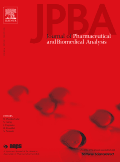
Journal of Pharmaceutical and Biomedical Analysis
Unraveling complexities in drug development and clinical biochemistry.The Journal of Pharmaceutical and Biomedical Analysis, published by ELSEVIER and available in print and online formats, stands as a pivotal source of knowledge in the realms of Analytical Chemistry, Clinical Biochemistry, Drug Discovery, and Pharmaceutical Science. With an ISSN of 0731-7085 and an e-ISSN of 1873-264X, this journal is dedicated to publishing high-quality research that advances the understanding and development of analytical techniques in pharmaceuticals and biomedicine. The journal has earned a solid reputation, reflected in its Q2 category rankings across five distinct fields for 2023, and boasts impressive Scopus rankings, signaling its robust impact within the academic community. The Journal of Pharmaceutical and Biomedical Analysis serves as an essential resource for researchers, professionals, and students alike, providing actionable insights and fostering innovation that can directly influence future advancements in drug development and biomedical applications.

MICROCHEMICAL JOURNAL
Unveiling Insights in Microchemical ProcessesMicrochemical Journal, published by Elsevier, stands as a leading scholarly publication in the fields of Analytical Chemistry and Spectroscopy, boasting impressive rankings of Q1 and Q2 in their respective categories for 2023. With an H-index reflecting its substantial impact and relevance, this journal has been a cornerstone of research dissemination since its inception in 1957, and it continues to play a vital role in advancing the methodological and technological innovations within these disciplines. The journal presents peer-reviewed articles that explore a wide array of topics, making it an essential resource for researchers, professionals, and students keen on the latest advancements in microchemical processes and techniques. Although it does not currently offer open access options, its publication through Elsevier ensures a high standard of academic integrity and wide accessibility through various academic institutions. With a strong Scopus ranking—9th in Chemistry Spectroscopy and 22nd in Analytical Chemistry—Microchemical Journal is an indispensable platform for empirical studies, insightful reviews, and pioneering methodologies in the microchemical domain.